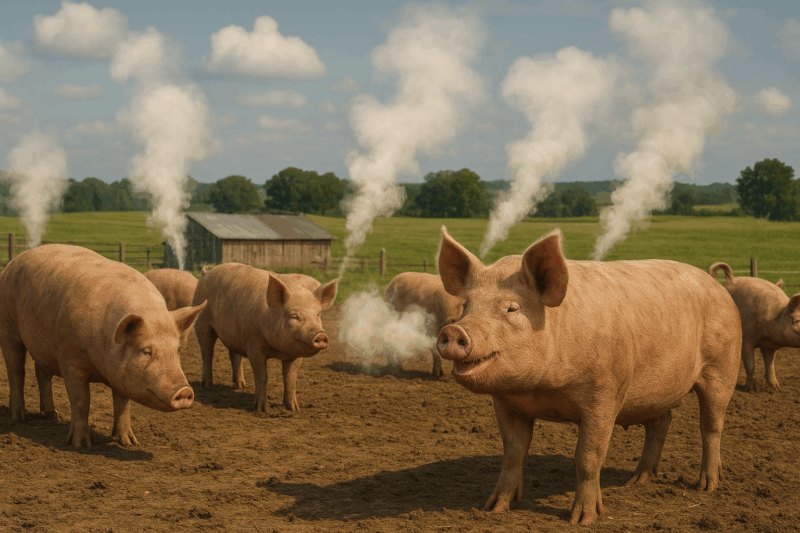Support CleanTechnica’s work through a Substack subscription or on Stripe.
Years ago, there was an article I read about Harvard University research which identified a connection between consuming some amount of bacon on a regular basis and increased death risk. In general, it’s processed red meat that is regarded to be a problem for human health, not only bacon. “Cutting down on hot dogs, sausages and bacon may help you avoid a premature death from cancer, along with heart disease and other causes, suggests a new study of almost half a million Europeans.”
Hot dogs, sausages, and bacon come from pork (pig meat), although there are beef frankfurters and sausages from non-pork meats. There are also vegan, as in plant-based, sausages. Generally speaking, hot dogs, sausages, and bacon are associated with pork.
A research study conducted in Europe found that, “For colorectal cancer risk, eating over 18 grams of red meat per week – a small burger every day – increases risk. Any amount of processed meat eaten regularly was found to increase risk, which is why AICR recommends avoiding processed meats for cancer prevention.”
But is pork bad for climate change just like beef and dairy products? Yes, pigs are one of the worst agricultural animals for climate change. “Cattle, pigs, and poultry collectively represent the top three sources of carbon emissions among various animal species, with pork production being the second contributor.”
Manure management, feed production for pigs, and pig transportation are three causes of climate change emissions associated with pork products. The bacon eaters will probably not like to read this, but here it goes anyway. “To produce a single strip of bacon, a quantity of manure 80 times the weight of that strip was produced. For a nation of bacon lovers, that amounts to about 331 billion pounds of manure from bacon alone, not even accounting for the manure produced by other types of pork.”
What a ginormous amount of pig poo just for bacon. Well, some people like that taste of bacon, but is it necessary for humans to eat it? Nope, not at all. There are some who believe a protein must be an animal food, which actually has never been true. There are plenty of protein sources from plant foods that have all 9 essential amino acids and therefore are complete. They may have less amino acids in certain cases but that can be overcome by combining them with other plant foods: rice and beans, lentils and adzuki beans, black beans with TVP, etc.
There’s another source of greenhouse emissions that may not be well known, or is virtually unknown. “Each year, the U.S. pork industry slaughters about 130 million pigs to make ground pork, bacon and chops. An estimated 90 percent are killed using CO2 gas, according to the Animal Welfare Institute — that’s almost 120 million pigs in total — and gassing them with carbon dioxide adds up.”
When it comes to beef and pork, there is a false framing where some online articles claim that replacing beef with pork is better for the environment, which is sort of inaccurate and mostly a mistake. It’s similar to the profound error that some people make when they believe hybrids are good for the environment, when in fact, they are just a little less terrible than fully gas-powered cars. There isn’t anything good about hybrids for the environment because they still use fossil fuels.
The best choice is forgotten about because of the false framing of a gas vehicle vs. a gas/electric vehicle, when the best choice is a fully electric vehicle, or riding an e-bike, an e-motorcycle, riding an electric train or bus, walking, or riding a non-motorized bicycle.
The best choice for climate change friendly foods are the plant-based foods, not a piece of pork instead of a piece of a dead cow. There is another error in this context which is that some people buy and eat ‘eco meat’, even though there isn’t anything ecological about the meat products they buy, but perhaps there are little less damaging. Again, the best choice would be no damage or the least amount of damage, not slightly less damage.
This article is part of a little mini-series with information about the highest carbon foods, meaning they are the worst for climate change. Beef, dairy products, farmed shrimp, lamb, and pork are commonly eaten foods and they are some the highest carbon foods too. Too often, it seems our human foods choices are based on feelings, not facts.
Sign up for CleanTechnica’s Weekly Substack for Zach and Scott’s in-depth analyses and high level summaries, sign up for our daily newsletter, and follow us on Google News!
Have a tip for CleanTechnica? Want to advertise? Want to suggest a guest for our CleanTech Talk podcast? Contact us here.
Sign up for our daily newsletter for 15 new cleantech stories a day. Or sign up for our weekly one on top stories of the week if daily is too frequent.
CleanTechnica uses affiliate links. See our policy here.
CleanTechnica’s Comment Policy

